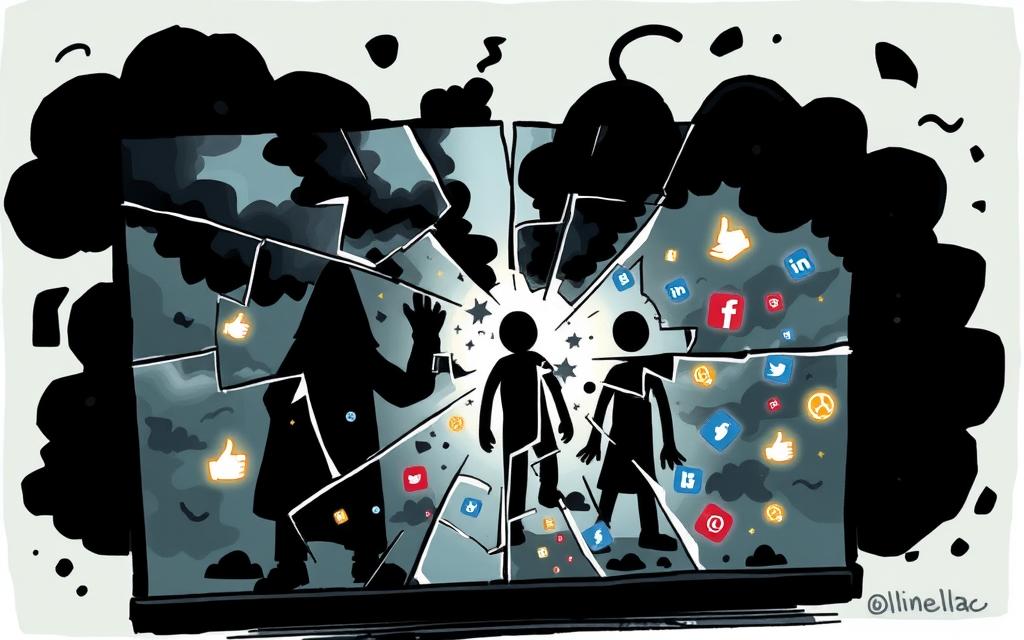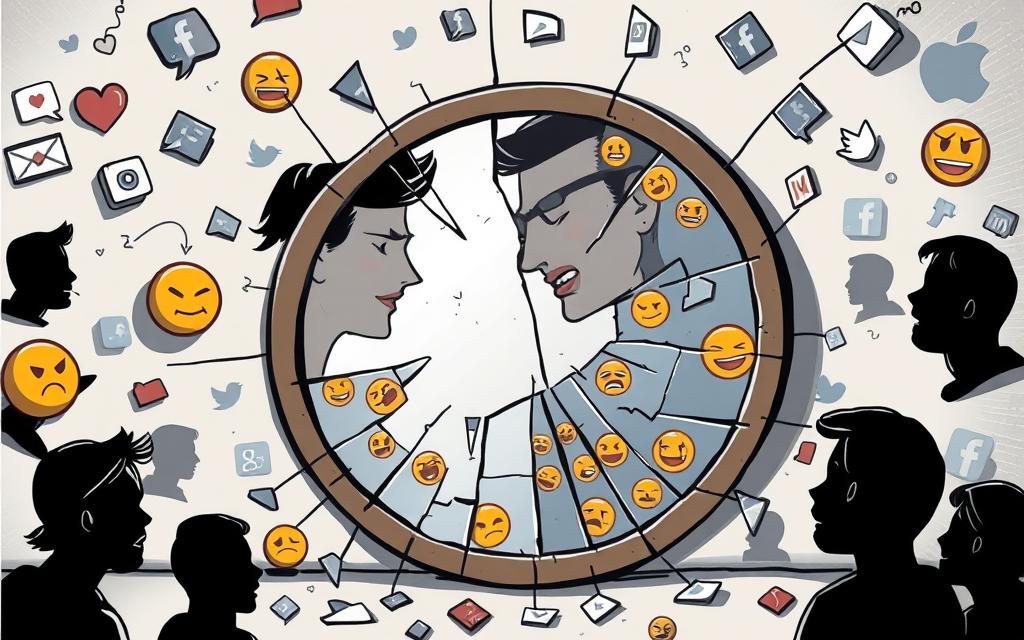The internet is full of chances for growth and connection. But it also brings a risk: online defamation. Imagine working hard to build your brand or reputation, only to have it damaged by false claims or mean attacks online. This blog will share strategies and insights to help you take back control and protect your online image.
Reputation Return offers detailed solutions to overcome online defamation’s harm. They use advanced reputation management methods to remove or hide negative content. They also keep an eye on your online presence and help rebuild your reputation, all while offering emotional support.
Key Takeaways:
- Online defamation can greatly harm personal and business reputations.
- Legal steps, like sending cease and desist letters or filing lawsuits, can fight online defamation.
- It’s key to have strategies for removing defamatory content and rebuilding your reputation.
- Knowing how online defamation lawsuits work can guide you through the legal process.
- Getting a skilled defamation attorney is crucial for defending your rights and interests.
What Is Online Defamation?
Online defamation is a big problem in today’s growing digital world. It happens when false or misleading statements harm someone’s reputation online. This can occur on social media, blogs, and forums. There are two main types: libel (written or permanent online posts) and slander (spoken online, like in videos or live streams).
To be considered defamatory, a statement must be false and damage someone’s reputation. It also needs to be seen by someone else. Online, false statements can spread fast, reaching many people quickly.
Dealing with online defamation is tough, especially if the person behind it is anonymous. Legal steps are needed to find out who did it. The harm caused by online defamation can be huge, making victims feel helpless.
Would you like to ask us questions? Request a free consultation.
It’s important to know the difference between defamation and freedom of speech online. Also, understanding the legal side of successful defamation lawsuits is key in today’s digital world.
| Scenario | Examples of Online Defamation |
|---|---|
| Fraudulent negative reviews | False claims about a business’s products or services on platforms like Google Business or Yelp |
| Allegations of malpractice | Untrue statements about a professional’s competence or conduct on industry-specific websites |
| Accusations of harassment | Fabricated claims of misconduct on social media platforms |

Stopping online defamation is hard, but knowing how to handle it can help. Getting legal advice, documenting the false content, and reporting it are key steps. These actions can help reduce the damage caused by false statements online.
Impact of Online Defamation on Businesses and Brands
Online defamation can hurt businesses and influencer brands a lot. False and harmful statements online can damage a brand’s reputation. This can make people lose trust and stop following or buying from them.
This damage can lead to financial losses. With less trust, sales and revenue go down. Influencers might get fewer sponsorships, and fixing their reputation can cost a lot.
Another big problem is losing partnerships. A bad reputation makes other companies not want to work with you. This can mean missing out on chances and losing money. Businesses need to act fast when faced with defamation, getting legal advice to know their options.
Protecting Your Brand from Online Defamation
Quickly fixing false information from unhappy customers or employees can stop defamation problems. Getting an injunction can stop false statements from spreading. Also, good reviews can help balance out the bad ones.
Managing your reputation is key after an online defamation attack. Watching and fixing negative content online can lessen defamation’s effects. Can reputation management help resolve online defamation? Yes, it’s very important for fixing and keeping a brand’s good name.
| Common Forms of Online Defamation | Potential Impacts on Businesses |
|---|---|
| Fake reviews and verbal lies | Reputation damage, financial loss, loss of partnerships |
| False written statements (libel) | Reputation damage, financial loss, legal consequences |
| Harmful spoken remarks (slander) | Reputation damage, financial loss, legal consequences |
Businesses hit by online defamation must act fast to protect their brand. The role of reputation management in mitigating online defamation is key to rebuilding trust and protecting against online harm.

Steps to Take When Dealing with Online Defamation
Dealing with online defamation can be tough, but acting fast and smart is key to protect your reputation. Here are steps to lessen the harm of false content:
- Stay calm and collect proof of the false claims against you. Save screenshots or posts that matter.
- Try talking to the person who shared the false content. A polite ask to take it down might work.
- If talking doesn’t help, talk to a defamation lawyer. They can guide you on what to do next, like managing your reputation or removing content.
- Report the false content to social media sites. They have rules to handle such cases and can help remove it.
- Use tools like the Wayback Machine to keep evidence of the false content. Online info can change or disappear fast.
- If the problem keeps going, look into legal steps. This could mean sending a cease and desist letter or suing.
Acting fast and using a detailed plan is vital when facing online defamation. By following these steps, you can defend your reputation and reduce the harm from false statements.

“Cases of online defamation can escalate quickly, especially on multiple platforms, requiring a thorough approach to gathering evidence.”
Handling online defamation is tough, but staying calm and focused is crucial. By being proactive and strategic, you can fight back against false content. This protects your reputation and business.
Consulting a Defamation Attorney
Dealing with online defamation can be tough. But, talking to a skilled defamation attorney can change things. At [Law Firm Name], our experts offer advice and help you find the right path forward.
Reputation Management
Getting rid of false content is key to protecting your reputation. But, the damage to your image can last. Our team creates special plans to fix your public image. We use the latest methods and legal knowledge to help you rebuild trust after defamation and protect your brand from online defamation.
Defamation Claims
To win a defamation case, you need to prove a few things. First, the statement must be false and presented as fact. Second, it must have harmed your reputation and caused financial losses. Lastly, it must have been made with malice or carelessness. Our defamation lawyers are ready to gather evidence and fight for your rights, offering the legal remedies for individuals affected by online defamation.
Content Removal
If you’re struggling to remove false content, we can help. We can send a cease-and-desist letter if the person is known. We also work with websites to take down the content or get a court order to block it from search engines.
Don’t let online defamation harm your reputation or business. Reach out to our defamation attorneys today. We’ll find the best way to help you.

Emotional Distress Damages
Online defamation can hurt more than just your wallet. It can also damage your mental health and overall well-being. It’s important to prove these emotional damages because they can be more significant than financial losses.
Being defamed online can lead to serious mental health issues. These include depression, anxiety, PTSD, and even suicidal thoughts. Victims may feel bad about themselves, have trouble with relationships, and struggle at work. These invisible wounds can be as harmful as financial losses.
To prove emotional distress, you’ll need medical records and expert opinions. Records from mental health professionals, prescriptions for anxiety, and visits to the emergency room can be strong evidence. A good lawyer can help show how online defamation has affected your life, helping you get the compensation you need.
“Emotional distress is a real and lasting consequence of online defamation. Victims deserve justice, not just for their bank accounts, but for the invisible scars that haunt them daily.”
Finding the right lawyer is key to dealing with emotional distress damages. They can help you collect the right documents, work with mental health experts, and make sure your suffering is recognized. Don’t ignore the emotional impact of online attacks. Seek help to heal and move forward.

Rebutting Emotional Distress Damages
Dealing with online defamation can be tough, especially when it comes to emotional distress. Mental health reports can be hard to challenge. But, proving emotional distress often needs special knowledge.
For instance, a neurologist’s opinion is key to diagnose temporary amnesia. This is because it can look like serious illnesses that also cause memory loss. Trying to link the plaintiff’s emotional state to the defamation can lead to tough questioning. This is because their past health, including past prescriptions and anxiety, might show the issue isn’t just about the defamation.
It’s important to check if the experts are really qualified. Can reputation management help resolve online defamation? Knowing how to tackle emotional distress damages helps you deal with legal and emotional sides of the issue.
| Key Considerations | Potential Strategies |
|---|---|
| Specialized Expertise | Consult neurologists, psychiatrists, and other mental health professionals with relevant credentials to properly assess the plaintiff’s condition and its potential causes. |
| Previous Health History | Thoroughly examine the plaintiff’s medical records and past experiences to identify alternative factors that may have contributed to their emotional distress. |
| Witness Credibility | Carefully scrutinize the qualifications and expertise of the mental health professionals testifying on behalf of the plaintiff. |
By using a smart and informed strategy, you can handle online defamation cases well. This helps protect your reputation.
“Evaluating the credibility and qualifications of expert witnesses is crucial in these cases.”
Quantifying Emotional Damages
After online defamation, it’s key to measure the emotional harm you’ve faced. Signs include anxiety, depression, and mood swings. These can affect your job, no matter what you do.
Emotional distress can make you a liability at work. This might lead to job loss and financial problems. Medications for these issues can also cause side effects, making work harder.
To get fair compensation, it’s vital to show the emotional harm. Online reputation management services can help. They provide evidence of the emotional toll from false accusations.
Measuring the Impact of Emotional Distress
- Document changes in job performance, including missed deadlines, reduced productivity, and any disciplinary actions taken by employers.
- Gather medical records and receipts for any treatment, counseling, or medication prescribed to manage the emotional distress.
- Collect witness statements from colleagues, clients, or industry peers attesting to the observed changes in your behavior and reputation.
- Conduct surveys or polls to measure changes in public perception before and after the defamatory statements were made.
- Seek expert testimony from mental health professionals or reputation management specialists to assess the extent of the emotional damage and its financial impact.
| Emotional Distress Damages | Potential Compensation |
|---|---|
| Anxiety, depression, and other mental health issues | Medical expenses, lost wages, and pain and suffering |
| Damage to personal and professional relationships | Loss of business opportunities, lost income, and reputational harm |
| Humiliation, embarrassment, and loss of enjoyment of life | General damages for emotional distress and mental anguish |
By documenting the emotional impact of online defamation, you can build a strong case. This helps you seek compensation and recover your reputation and regain your trust.
online defamation
In today’s world, defamation has changed a lot. Online defamation means false information online that harms your name or business. This can happen on social media or in online reviews.
Can You Sue for Defamation on Social Media Platforms?
Yes, you can take legal action for defamation on social media. This includes false information on many digital platforms. For it to be considered defamation, it must be published, false, harmful, and not protected.
Understanding the Legal Consequences of Online Defamation
The legal effects of online defamation can be serious. False statements can lead to lawsuits and big money damages. In some cases, juries have awarded over $230 million in damages.
Navigating the Complexities of Libel and Slander in the Digital World
It’s important to understand libel and slander online. Automated systems might miss some defamation. Even opinions can lead to legal trouble. Talking to a lawyer can help protect your online reputation.
“The legal landscape surrounding online defamation is constantly evolving, and it’s essential to stay informed and proactive in protecting your reputation in the digital world.”
Elements of a Defamation Case
If you’ve been the victim of online defamation, knowing the key parts of a defamation case is key. A strong case against internet defamation has five main points:
- The statement must be false. You can’t sue for defamation if the statement is true. Truth is a solid defense.
- The statement must be negative. It must be false and harm your reputation.
- The statement must be communicated to a third party. This includes social media, websites, and other online platforms.
- The person who posted the statement must have been negligent. Posting something known to be false or without checking its truth can lead to a lawsuit.
- The statement must have caused you damage. You must show the defamatory comment harmed you emotionally, professionally, or financially.
Knowing these elements is key when fighting online defamation. It helps you understand how online defamation lawsuits work. By showing these points, you can seek justice for online defamation.
| Key Element | Description |
|---|---|
| Falsity | The statement must be clearly false, not just an opinion. |
| Negative Impact | The false statement must harm your reputation, leading to hatred, ridicule, or shame. |
| Third-Party Communication | The defamatory statement must be shared with others, not just you. |
| Defendant’s Fault | The person who made the false statement must have acted with negligence or malice. |
| Damages | You must have suffered real harm, like emotional distress or financial loss. |
Understanding these elements helps those affected by online defamation know their legal options. It guides them in taking the right steps to fight back against hurtful online comments.
Common Social Media Defamation
Social media has become a big place for defamation. False statements on third-party sites are considered internet defamation. This includes false claims of infidelity on dating sites and attacks on social media.
It also includes fake reports and comments on gossip sites. Fake business reviews and false statements on consumer advocacy sites are also defamation. And, false and negative posts on forums and message boards are included too.
Social media has made it easier for false statements to harm people or companies worldwide. More than $230 million was awarded in defamation cases against public figures on social media. For example, election workers sued Rudy Giuliani for false claims of election fraud.
E. Jean Carroll won $88 million in two suits against Donald Trump for defamation. To be considered defamation on social media, the content must be false and harmful. It must also be published widely.
Defamation laws differ by state. The plaintiff must prove the statement was published and identified them. They must also show it caused harm to their reputation.
Public figures have a harder time proving defamation. They need to show “actual malice” or reckless disregard for the truth.
Dealing with social media defamation can be tough. But, you can gather evidence and consult a lawyer. Sending cease and desist letters and taking legal action are also options.
It’s important to act fast and get legal help to handle these issues well.
| Examples of Successful Online Defamation Lawsuits | Amount Awarded |
|---|---|
| E. Jean Carroll vs. Donald Trump (two separate suits) | $88 million |
| Defamation case against Rudy Giuliani for false election fraud claims | Undisclosed |
| Defamation cases against public figures involving social media misinformation | Over $230 million |
To protect your brand from online defamation, you need to be vigilant and have legal help. Understanding what makes a defamation case and how to handle social media attacks is key. This way, you can protect your reputation and take appropriate legal action when needed.
Challenges in Online Defamation Cases
Dealing with online defamation is tough. It’s hard to find who wrote a false post and gather evidence. Reputation management helps reduce the harm of online defamation without going to court.
Unraveling Online Anonymity
Finding the person behind a false statement online is hard. The internet makes it easy to stay anonymous. Reputation management experts use special methods to find the source of the harm.
Preserving Digital Evidence
It’s key to keep evidence in online defamation cases. Posts can be deleted or changed fast. Reputation management pros use tools to save screenshots and web pages for a strong case.
Navigating Legal Jurisdictions
The internet is global, making legal issues complex. Finding the right place for a lawsuit is hard. It involves looking at laws in different places.
By using reputation management and talking to defamation lawyers, you can fight back. This helps protect your online image.
| Challenge | Description | Strategies to Address |
|---|---|---|
| Identifying the Author | Finding who wrote a false post because of online anonymity. | Using special methods like domain searches and IP tracing. |
| Collecting Evidence | Keeping records of the original false content as it can change or disappear. | Creating screenshots, saving web pages, and using digital tools. |
| Jurisdictional Complexities | Finding the right legal place for a lawsuit because of the internet’s global reach. | Talking to lawyers to understand laws in different places. |
“The impact of defamation has expanded with the rise of social media platforms and online forums. The long-lasting effects of online defamation on individuals, businesses, and their digital reputations highlight the urgency of addressing false statements.”
Conclusion
If your reputation is at risk, it’s time to seek a lawyer who specializes in internet defamation lawsuits. Attorney Jesse Haskins has a strong track record in helping those affected by false and harmful statements. He will examine the statements, talk to witnesses, and help you seek fair compensation if your case is strong.
Can online reputation management help rebuild trust after defamation? Yes, a skilled professional can use various methods to reduce negative content and improve your online image. The importance of hiring a lawyer for online defamation cases is huge. They know the legal world well and can handle the tough parts like finding the source, gathering evidence, and figuring out damages.
Strategies for removing defamatory content online are crucial, but they need to be done carefully with an experienced lawyer’s help. Don’t let false and damaging statements harm your reputation or business. Act now to protect what you’ve built with hard work.

